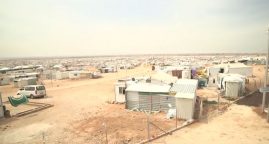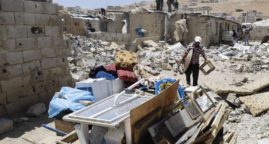Portugal does not mind receiving refugees
Faced with the desertion of rural areas and a declining population, the Portuguese Government puts in place the structures to accommodate 10,000 Syrians, Iraqis and Afghans
Bragança is a city of 35,000 inhabitants located in northeastern Portugal, near the Spanish border. It is also the capital of the agricultural purpose district of the same name. The lands are vested primarily cereal crops and chestnut groves. However, this region, like many others in the country, is empty. During the past four years, the country as a whole, recorded 485,000 departures, permanent or temporary. This wave hit particularly north and central area. Bragança has already sounded the alarm.
This exodus worries Lisbon, but it has found a solution: welcome by many refugees knocking on the door of Europe. So as part of the relocation program for 160,000 refugees already in Europe, particularly in Greece and Italy, Portugal offered to host 5800 of them, in addition to its quota for 5400 allocated by Brussels. By comparison, Spain is supposed to accommodate 15,000 refugees in two years.
At the EU summit on 22 February, the Portuguese Prime Minister Antonio Costa spoke of “moral act and a good opportunity to repopulate rural areas.” In a letter sent in late February to Italy and Greece, but also in other European countries including Austria and Germany, the Portuguese government has clarified its intentions. It wants to host in 2000 and 800 university students in vocational schools and between 2,500 and 3,000 refugees to work in agriculture and forestry. The region of Bragança has already shown an interest in receiving refugees.
“Portugal is unknown as a land of immigration, explained Maria Vicenza Desiderio, an analyst at Migration Policy Migration Policy Institute, a center for specialized studies in Brussels. Their arrival will benefit the whole country, but especially to become rural areas. “In addition to that the birth rate is the lowest in Europe, is also the country where the rate of aging is one of the highest in the continent. In 2030, a third of the population will be over 65.
The Socialist government wants to go ahead with his plan despite the country emerging from a long economic crisis and unemployment remains at a high level (12%). Maria Vicenza Desiderio estimated that Portugal, like other European countries, refugees accept jobs that do not want the locals. “Furthermore, she added, the reception will be gradual.” For now, it hosted 150 out of 930 in Europe that were relocated from Greece or Italy.
But do the Portuguese dread the arrival of a large number of Syrians, Iraqis or Afghans? Maria Desiderio Vicenza wants to be reassuring. “This is a country of emigrants which includes migration, she said. The state has set up the Portuguese Refugee Council which is responsible for facilitating the reception and integration. He also leads an extensive outreach to rural populations that will get strangers. “She said the coordination between civil society and communities is essential.
The question remains whether the refugees want to settle in Portugal. For now, they prefer the countries of northern Europe.
Translate from the french.
Read the full article (Ram Etwareea) on Le Temps website
Related Articles
What It Means When 5 Million Syrians Leave Their Country
03/30/2017. As the war there stretches into a seventh year, more than five million citizens, nearly a quarter of Syria’s prewar population, have fled their country.
The Atlas of Environmental Migration
May 2017. Through elaborate maps, diagrams, illustrations and case studies the Atlas guides the reader from the roots of environmental migration through to governance.
Back to the Chain Gang
07/08/2019. Lebanon is increasingly mistreating its Syrian refugees, even sending some home to face a terrible fate.






